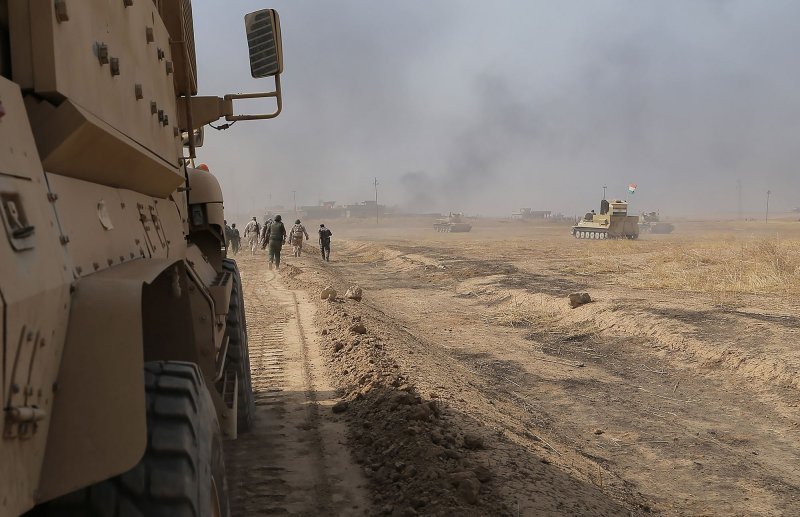Iraqi Kurdish Peshmerga fighters watching smoke billowing as they deploy in the area in Dohuk, north of Mosul, during an operation to attack Islamic State militants. UPI Photo |
License Photo
WASHINGTON, D.C. -- Much of the discussion about the offensive to recapture the Iraqi city of Mosul from the Islamic State has revolved around how ethnic and sectarian cleavages could make the military operation problematic. An equally difficult, and perhaps even more daunting, problem is who will fund the enormous costs of reconstruction in Mosul and other Iraqi cities liberated from IS control.
Mosul is likely to be heavily damaged when anti-IS Iraqi forces retake the city. A large part — perhaps 80 percent — of Ramadi was essentially in ruins when the Iraqi government reclaimed it in late 2015.
Ramadi, once a thriving city of about 500,000 people, is mostly uninhabitable. About 50 bridges in the city were destroyed, as were many schools, hospitals and other structures. Some estimates of the cost to rebuild Ramadi reach $10 billion. Other cities in central, western and northern Iraq were heavily damaged when they were retaken from IS.
The deputy governor of Anbar province (where Ramadi is located) said in September that the reconstruction of the cities in his province would cost about $22 billion.
As for Mosul, reports have indicated that IS is busy installing improvised explosive devices and other booby traps to make street-to-street fighting very costly for Iraqi government forces and their allies. Many buildings are likely to be damaged either from IS blowing them up as they retreat or from artillery and airstrikes from Iraqi government and coalition forces.
Rebuilding Mosul is likely to cost tens of billions of dollars and no one has a clear answer as to where the money to rebuild it and other major cities will be found.
Because of low oil prices, economic mismanagement and corruption, the Iraqi government is expected to register a budget deficit of at least $20 billion this year. Although pressure will mount on Prime Minister Haider al-Abadi to shift resources to this massive reconstruction effort, it will likely be checked by his need to provide for civil service salaries, internal security and social welfare services.
The United States has led an effort to solicit funds from the international community to help Iraq but much of the money is geared toward immediate needs, such as the care of internal refugees. U.S. Secretary of State John Kerry convened an international meeting in Washington in July during which a group of countries pledged a total of $2 billion for Iraq, 25 percent of which would be allocated for humanitarian needs and the rest for "demining operations" and "stabilisation" efforts. Tikrit, in northern Iraq, is said to be one of the most mined cities in the world.
Kerry emphasized at the meeting that "we are here to deal with" the estimated 3.3 million internally displaced Iraqis, not the broader challenge of reconstruction. There will be more internal refugees because of the fight to retake Mosul. The United Nations estimates it will require $184 million to care for them.
In September, the Iraqi government took the initiative in having a convention at the Baghdad International Airport that included representatives from 50 foreign and Arab governments as well as international construction companies to examine the opportunities to rebuild Iraqi cities. The event was co-sponsored by the UN Development Program.
In what can only be described as a gross understatement, the deputy governor of Anbar province said the government had not been able to remove debris from Ramadi because of the "financial crisis".
This, of course, begs the question as to who will fund Iraqi reconstruction. International companies, while seemingly interested in taking part in the effort, will not go forward without being assured of payment.
Given the poor state of Iraqi government finances, donations from the international community are the only realistic option at this stage but there is a good deal of donor fatigue, especially as European countries are coping with the large influx of Middle Eastern refugees.
Leaving these damaged cities in the Sunni heartland of Iraq in a state of disrepair will feed Sunni resentment, which, if not addressed, will make the situation ripe for another group like IS to emerge. It behooves the international community, including Gulf Cooperation Council countries, for both strategic and humanitarian reasons, to develop a reconstruction plan for Iraq and a realistic mechanism to pay for it.
Gregory Aftandilian is a lecturer at the Pardee School of Global Studies at Boston University and is a former U.S. State Department Middle East analyst. This article originally appeared at The Arab Weekly.















